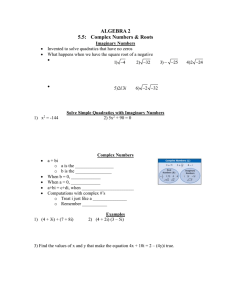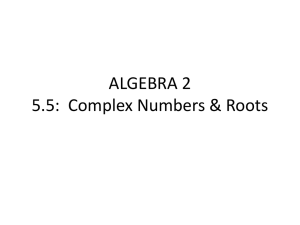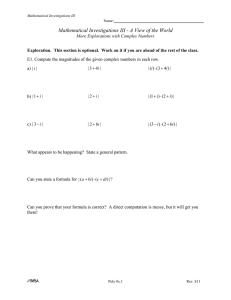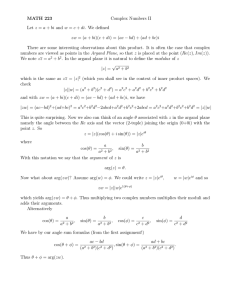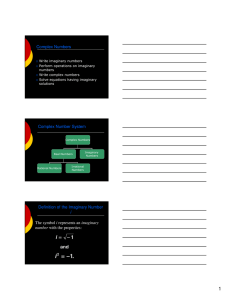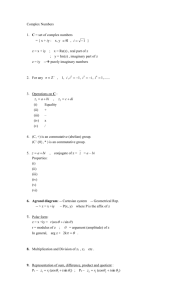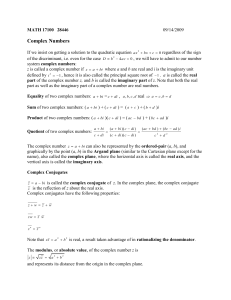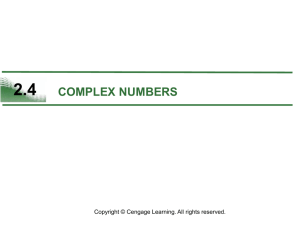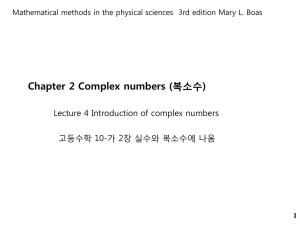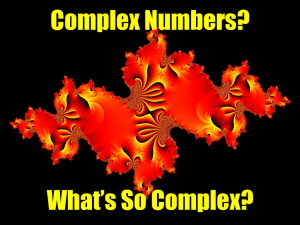_______________
advertisement
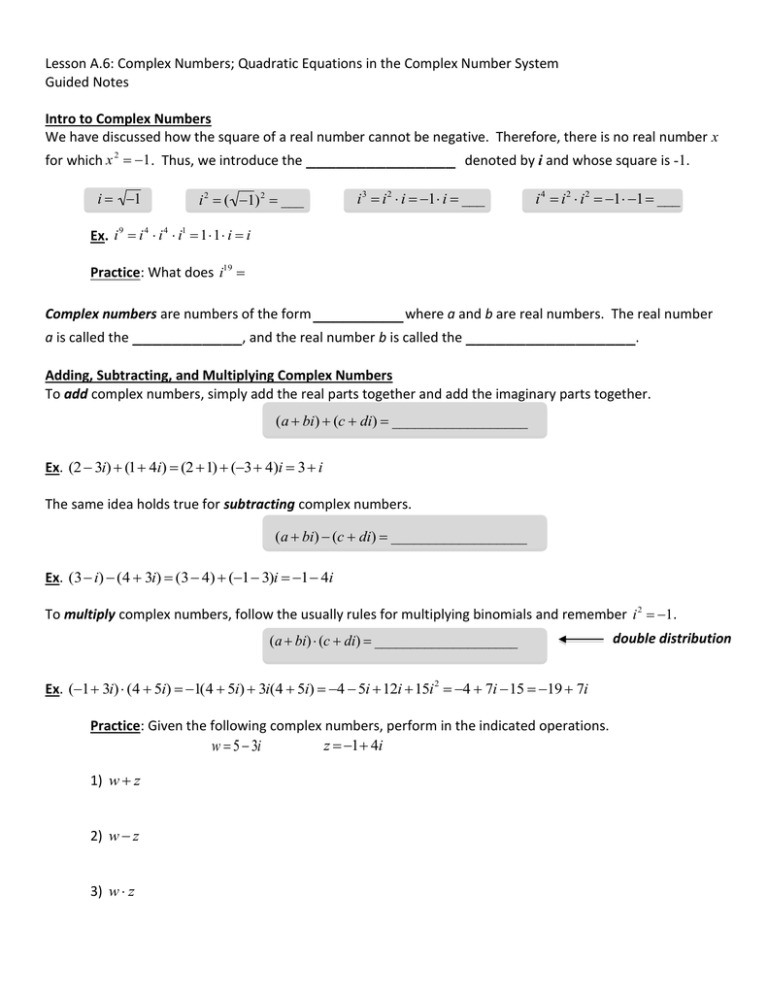
Lesson A.6: Complex Numbers; Quadratic Equations in the Complex Number System Guided Notes Intro to Complex Numbers We have discussed how the square of a real number cannot be negative. Therefore, there is no real number x for which x 2 1. Thus, we introduce the _______________ denoted by i and whose square is -1. i 1 i 2 ( 1) 2 ___ i 3 i 2 i 1 i ___ i 4 i 2 i 2 1 1 ___ Ex. i 9 i 4 i 4 i1 11 i i Practice: What does i19 Complex numbers are numbers of the form _________where a and b are real numbers. The real number a is called the ___________ , and the real number b is called the _________________. Adding, Subtracting, and Multiplying Complex Numbers To add complex numbers, simply add the real parts together and add the imaginary parts together. (a bi) (c di) __________________ Ex. (2 3i) (1 4i) (2 1) (3 4)i 3 i The same idea holds true for subtracting complex numbers. (a bi) (c di) __________________ Ex. (3 i) (4 3i) (3 4) (1 3)i 1 4i To multiply complex numbers, follow the usually rules for multiplying binomials and remember i 2 1. (a bi) (c di) ____________________ Ex. (1 3i) (4 5i) 1(4 5i) 3i(4 5i) 4 5i 12i 15i 2 4 7i 15 19 7i Practice: Given the following complex numbers, perform in the indicated operations. z 1 4i w 5 3i 1) w z 2) w z 3) w z double distribution Conjugates of Complex Numbers If z a bi is a complex number, then its ______________, denoted z , is defined as z a bi _________ Ex. If z 2 3i then its conjugate is z 2 3i Let’s see what happens if we multiply a complex numbers with its conjugate! zz ________ abi b2i 2 a2 b2 zz (a bi)(a bi) a2 abi Ex. (2 3i)(2 3i) 4 6i 6i 9i 2 4 9 13 Or using formula (2 3i)(2 3i) 22 32 4 9 13 Practice. Find the conjugate of the following complex numbers and then multiply. 1) z 3 4i 2) z 1 8i 3) z 2i Dividing Complex Numbers divide complex numbers, we can multiply the numerator and denominator by the conjugate of the To denominator . Ex. 2 3i ______ 2 4 3i 4 (3) 2 16 9 25 25 25 Practice: 3 i 2 4i Let’s Practice What We’ve Learned! Given the following complex numbers, perform the indicated operations. w 2 3i 1) w z 2) w z 3) w z 4) w z z 5 2i Solving Quadratic Equations with a Negative Discriminant We have discussed how a quadratic equation with a negative discriminant has no real number solution. For example, Cannot square root a negative in Ex 1: x 2 4 0 x 2 4 x 4 the real number system However, if we extend our number system to allow complex numbers, quadratic equations will __________ _______________. Thus, if N is a positive real number, we define the __________________, denoted N , as N ______ Ex 2. Ex 3. Ex 4. 1 1i i 4 4i 2i 8 8i 2 2i Practice 1: Practice 2: 3 18 Let’s apply this to solving quadratic equations in the complex number system. Ex 5. Solve x 2 4 0 x2 4 0 x 2 4 x 4 x 2i x 4i Practice 3: Solve x 2 9 0 Now let’s look at quadratic equations where we must complete the square to solve. Ex 6. Solve x 2 4 x 8 0 in the complex number system x 2 4 x 4 8 4 (x 2) 2 4 x 2 4 x 2 2i x 2 2i Practice 4: Solve x 2 2x 4 0 in the complex number system Character of the Solutions of a Quadratic Equation In the complex number system, consider a quadratic equation ax 2 bx c 0 with real coefficients. 1. If b 2 4ac 0 , the equation ___________________________________. 2. If b 2 4ac 0 , the equation ___________________________________ . 3. If b 2 4ac 0 , the equation ___________________________________. Ex 7. Given x 2 4 x 8 from example 6, we can determine the character of its solution(s) b 2 4ac (4)2 4(1)(8) 16 0 Thus, two complex solutions This matches our solution of x 2 2i from example 6. Ex 8. Determine the character of the solutions for 9x 2 6x 1 0 , then solve for x. Thus, repeated real root b 2 4ac (6)2 4(9)(1) 0 We can factor to solve the equation 9x 2 6x 1 0 (3x 1)(3x 1) 0 x 13 , x 13 Repeated real root! Ex 9. Determine the character of the solutions for x 2 4 x 1 0 , then solve for x. Thus, two unequal real solutions b2 4ac (4)2 4(1)(1) 12 0 We can complete the square to solve the equation x 2 4x 4 1 4 (x 2)2 3 x 2 3 x 2 3 Two unequal real solutions! Practice 5: Determine the character of the solutions for x 2 6x 13 0, then solve for x.
